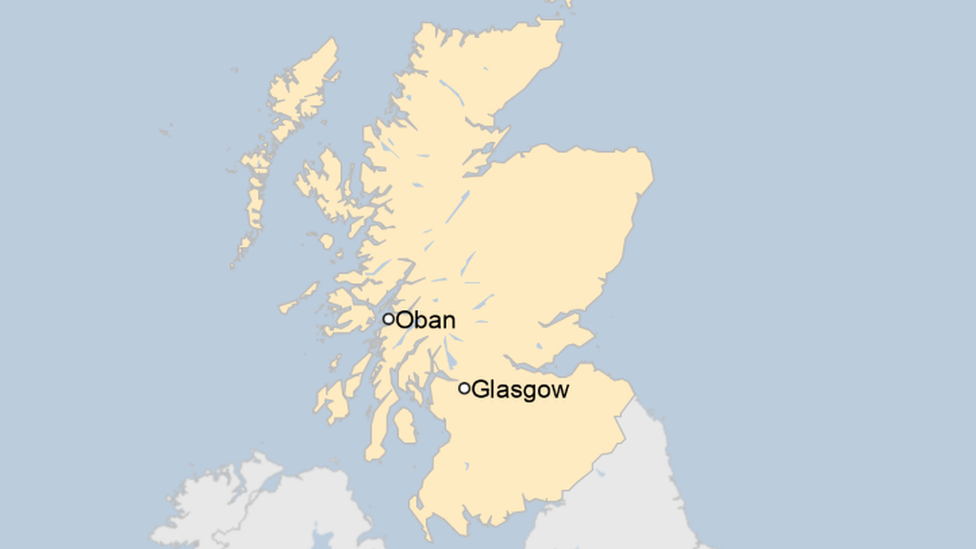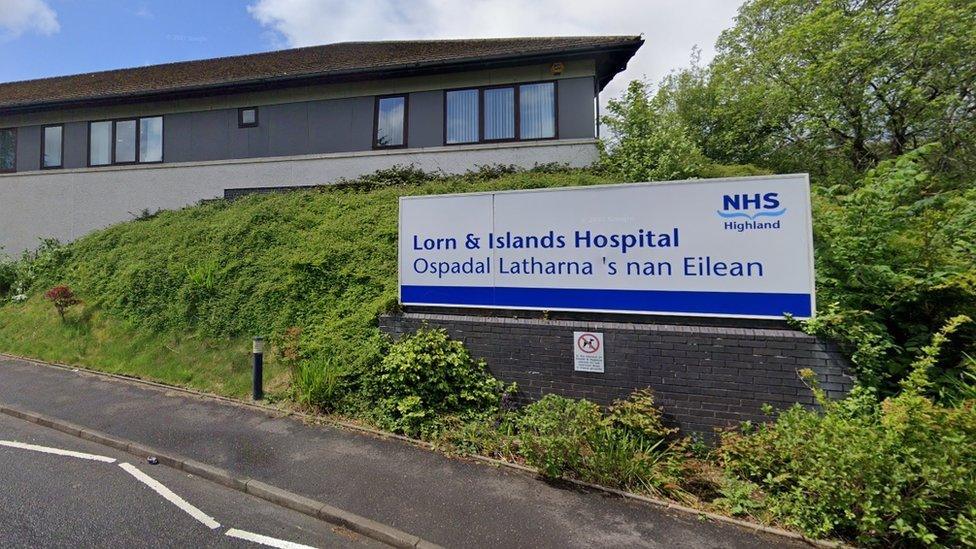Concern over 200-mile trips to access cancer care
- Published

A charity has raised concerns about the loss of some haematology services from Oban
Blood cancer patients in Argyll face having to make round trips of 200 miles or more to access some of their care.
In-person haematology consultations at their local hospital, Lorn and the Islands in Oban have been withdrawn.
Health boards providing the cancer services said virtual appointments were available, but added that some patients would need to travel to Glasgow.
Charity Blood Cancer UK said it was concerned that vulnerable patients were having to make long journeys.
NHS Greater Glasgow and Clyde provides the consultations with a blood specialist under an arrangement with NHS Highland, which provides health services in Argyll and Bute and the Highland region.
Virtual consultations have been made available, but in-person appointments are at a centre in Glasgow.
Vital support
The city is a round trip of about 200 miles (322 km) from Oban by car, while an average train journey one-way takes just over three hours.
Journeys are further for those living outside Oban, such as residents of Argyll's islands.
Blood Cancer UK chief executive Helen Rowntree has written to NHS Highland to raise concerns about the loss of the local service.
Speaking to the BBC's Good Morning Scotland programme, she said that "hundreds or thousands" of patients in the area would have been affected.
She said in-person consultations provided vital support to people dealing with cancer, and patients were worried by what they saw as a significant challenge of travelling to and from Glasgow.
Ms Rowntree added: "For those patients on 'watch and wait' these appointments are essential for determining if they've developed any new symptoms, discussing potential medication changes, or whether they need to start treatment."

She said for people who had recently received a diagnosis, the interactions with their haematologist and other clinical team members could play a transformative role in their future care.
Ms Rowntree added that blood cancer patients were a high-risk group and were at risk of infection due to their weakened immune system.
She added: "It's really important that [digital services] should be complimentary to face-to-face care, not replacing face-to-face care."
She called on NHS Highland to provide reassurances on patient safety and equity of care.
One patient, who asked to remain anonymous, was diagnosed 18 months ago,
He said his local in-person consultations had just ended, adding: "My next one will be in Glasgow - consultant identity, date and place all unknown."
The patient said: "I have shared waiting rooms in Oban hospital with folk much more ill and frailer than myself, some in wheelchairs, some who have already had to travel from the Argyll islands or distant parts in order to reach Oban.
"From now on these poor folk are being forced to travel another 200 miles return."
He added: "The trips to Glasgow worry me because the journey involves increased hassle and risk - especially in winter when getting to Glasgow from Oban is not always straightforward."

NHSGGC said there would still be day-care treatment at Lorne and Island Hospital
NHS Greater Glasgow and Clyde (NHSGGC) said that following a review, the clinical haematology service for Argyll and Bute patients was being delivered through a combination of in-person appointments at Glasgow's Beatson West of Scotland Cancer Centre, and virtual follow-up appointments.
The health board said this approach ensured patients had access to specialist treatment which was not available locally.
A spokesman said: "Every effort is taken to minimise the requirement for patients to travel for their consultations, however, in cases where more specialist treatment is needed this may be required.
"Day-care treatment remains at Lorne and Island Hospital, where NHSGGC has excellent links with the highly experienced team, as we continue to deliver the best care possible for our patients together."
He said the new model would remain under close review to ensure the patients were supported under the new arrangements.
NHS Highland said recruitment challenges in the health service meant the previous arrangements at Lorn and Islands could not be maintained.
It said an "enhanced virtual model" would help patients avoid having to make long journeys.
A spokesman added: "However, there will be inevitable requirements for patients to travel to NHSGGC to be seen face to face as their condition dictates.
"The Highlands and Islands travel scheme is available to support patients that need to travel significant distances to hospital appointments."